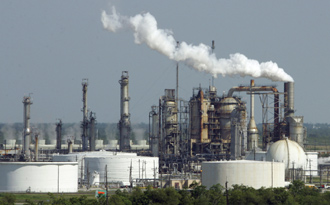
An oil refinery in Port Arthur, Texas, in May 2007. Why aren’t refineries meeting the demand for gas? (AP Photo)
 |
Stymied in reporting on gas prices? Try these questions
ASK THIS | May 151, 2007
Henry Banta: 'The shift of billions of dollars from average Americans to the shareholders and managers of oil companies is important news, as are the reasons behind it. This deserves far better coverage than it has gotten.'
By Henry Banta
henrybanta@aol.com
By any standard the media coverage of the current gasoline price increases leaves much to be desired. The gap between what is reported in the more sophisticated business press and what comes out in the popular media seems to grow wider.
As any reader of the Wall Street Journal knows, there is information available. And there are other good sources; Steven Pearlstein of the Washington Post consistently provides first rate analysis. But the popular media, network television in particular, abandon all pretense at serious journalism when dealing with gasoline prices. What passes for coverage is usually a microphone stuck in the face of a motorist who confirms what we all know, prices have gone up. This is followed by a brief interview with an expert who invokes the notion that it is all a matter of supply and demand, as if that ended the discussion. This is followed, no doubt for sake of “balance,” by someone labeled a “consumer advocate” who invokes the even more useless notion of “price gouging.” There the matter is left to rest. Even “in depth” coverage rarely gets beyond further interviews with experts from the window-shade-school of economic analysis: this number will go up; that one down; this one down; that one up.
What is lost in this ritual is some basic journalism. There are some simple common sense questions that are not asked. Start with the question of supply. Gasoline prices are up because refineries do not have the capacity to meet demand. It is frequently pointed out that no new refinery has been built since the late 1970s (implying that the problem is the fault of environmentalists.) But this fact alone raises a host of questions. Certainly gasoline demand has grown considerably since the late 1970s. Until now the industry has been able to meet demand growth with the expansion of existing refineries? Why not now?
Granted Hurricane Katrina did considerable damage to the refining industry, but Katrina was almost two years ago. Has not there been time to line up more gasoline imports? Surprisingly, the head of the Energy Information Agency recently told Congress that imports were down. If refining capacity was a problem, why were imports down? If, as has been occasionally suggested, there is a worldwide shortage of refining capacity, why is the explosion of refined product prices limited to the United States? The Wall Street Journal recently reported that “American refiners have made a pretax profit of roughly $30 on each barrel of oil they use to produce gasoline, more than three times the margin in Singapore, a major Asian refining center.” Wouldn't a world wide shortage of refining capacity drive up refining margins in Singapore?
A component of the supply problem is the amount of gasoline held in inventory. Not surprisingly a drop in inventories is cited as contributing to the high gasoline prices. Yet no one seems curious about why the industry has been reducing its gasoline inventories for more than a decade. In 1990 the industry carried enough gasoline inventory to cover about 30 days supply. By 2000 it fell to 23.8 days. We are now precariously close to the 20 days of supply considered a bare minimum to keep the system working. Surely this raises obvious questions. In a period of rising demand and allegedly constrained refining capacity, the industry cuts inventories – with the predictable effect of price spikes every time there is a crimp in the supply. Each such price spike has produced a massive windfall for the companies. If this doesn’t cry for further questions, what does?
Oil industry profits have always been an issue. One would think that by now we would have a firm grasp on the concept. Apparently not so. The industry flacks seem to be quite confident that they can get away with comparing the oil industry’s return on sales with the sales returns of firms in other industries. Profit is, and always has been, what investors get back on their investment. Comparisons of returns on sales are misleading gibberish. If sales returns mattered, GM would be doing better than Wal-Mart. Doesn’t the resort to such blatant nonsense require the question, why?
Now for the claim that the industry needs high prices and profits in order to make the investment needed for the future. To meet future energy demand, the major companies claim to be investing billions of dollars. This is true; but certainly not the whole truth. Christopher Palmeri of Business Week found that Exxon did reinvest nearly $20 billion, which roughly amounted to 40% of its cash flow, but this was down from the 50% reinvested in 2000. In fact, Exxon spent 60%, or $29 billion, of its cash flow on the repurchase of its own stock in 2006. He found that the industry as a whole spent $52.4 billion on stock repurchases last year – almost double the amount in 2005. In short, the current price run-up has transferred billions from consumers to shareholders. Nice work Mr. Palmeri. Does anybody read Business Week?
All of this raises some interesting questions about competition in the industry. If everybody in the industry is holding back on refining investment or reducing inventories, why didn’t one firm spot a profit opportunity and behave more aggressively? What kept one firm from expanding its inventory in order to take advantage of the next price run-up? Isn’t that what competition is about?
The question of competition has the ability to send the industry propaganda machine into overdrive like no other (which by itself should be a red flag). The industry constantly points to the myriad of investigations that have failed to catch them at anything illegal, as if that disposed of the issue. Granted it is bit complicated, but is it too much to ask journalists to understand the distinction between what violates the antitrust laws and what indicates a failure of competition in the economic sense? As the Supreme Court recently reminded us, the antitrust laws prohibit firms from doing certain things – like actually colluding on price. If they don’t get caught together in the electronic version of the smoke-filled room, there is not much the antitrust agencies can do. That, however, does not end the matter. Competition can exist in many degrees. The notion that industries dominated by large companies behave like local hardware stores is ludicrous. Surely there are question here that need to be asked.
Exploring these questions does not require a PhD in economics or petroleum engineering. It does require some intellectual curiosity and certainly hard work. But this issue deserves it. This is more than a news story about annoyed motorists. It involves fundamental questions about how well our market system is working in the energy area. The shift of billions of dollars from average Americans to the shareholders and managers of oil companies is important news, as are the reasons behind it. This deserves far better coverage than it has gotten.
|
|
Henry M. Banta is a partner in the Washington, DC, law firm of Lobel, Novins & Lamont. 
E-mail: henrybanta@aol.com
|
The focus should be simple
Posted by
Errin Familia -
06/152/2007, 01:22 PM
Focus on the fact that no new oil refinery has been made in America since 1977. That's thirty years now that our country has gone without a new refinery.
Thirty years! Come now... for not a single refinery to pop up in that span of time would require a deliberate tactic NOT to make any refineries. Otherwise, sheer chance and time would have lead to at least one new refinery in the last thirty years. Seriously... something's rotten in the state of Texas if not even one lousy refinery has been built in the last thirty years.
Can you imagine where this country would be if it were more concerned with progress and less concerned with the top of our status quo making money? Imagine how efficient our energy systems would be if there wasn't so much money to be made off of them.
|





